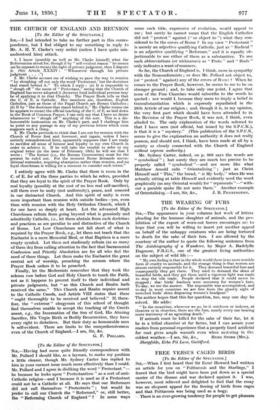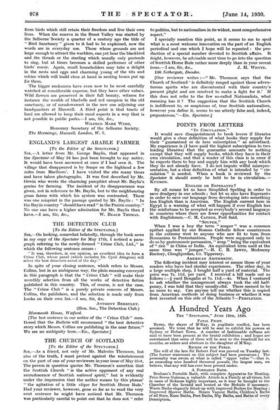FREE VERSUS CAGED BIRDS • [To the Editor of the
SPECTATOR.] Sm,—When I first heard that Sir Esme Howard had written an article for you on -" Psittacosis and the Starlings," I -feared that the bird might have been put down as a special
carrier of the disease and war declared against it. I was, however, most relieved and delighted to find that the essay was an eloquent appeal for the freeing of birds from cages and-that Psittacosis was being used as a bogy.
There is an ever-growing tendency for people to get pleasure
from birds which still retain their freedom and live their own lives. When the reserve in the Brent Valley was started by the Selborne 'Society a quarter of a century ago the title of " Bird Sanctuary " given to it had to be explained, now the words are in everyday use. Those whose grounds are not large enough to attract the warblers, can yet hear the blackbird and, the thrush or the starling which usually only pretends to sing, but at times becomes a skilled performer of other birds' music. Again, small householders may take a delight in the nests and eggs and charming young of the tits and robins which will build close at hand in nesting boxes put up for them.
The bigger enclosures have even now to be most carefully watched at considerable expense, but they have other values. Wild flowers are preserved in their full beauty, witness for instance the wealth of bluebells and red tampion in the old sanctuary, or of meadowsweet in the new one adjoining our headquarters at Hanwell. A third point is that tracts of land are allowed to keep their rural aspects in a way that is not possible in public parks.—I am, Sir, &c., WILFRED MARK WEBB, Honorary Secretary of the Selborne Society. The Hermitage, Hanwell, London, W. 7.



































 Previous page
Previous page